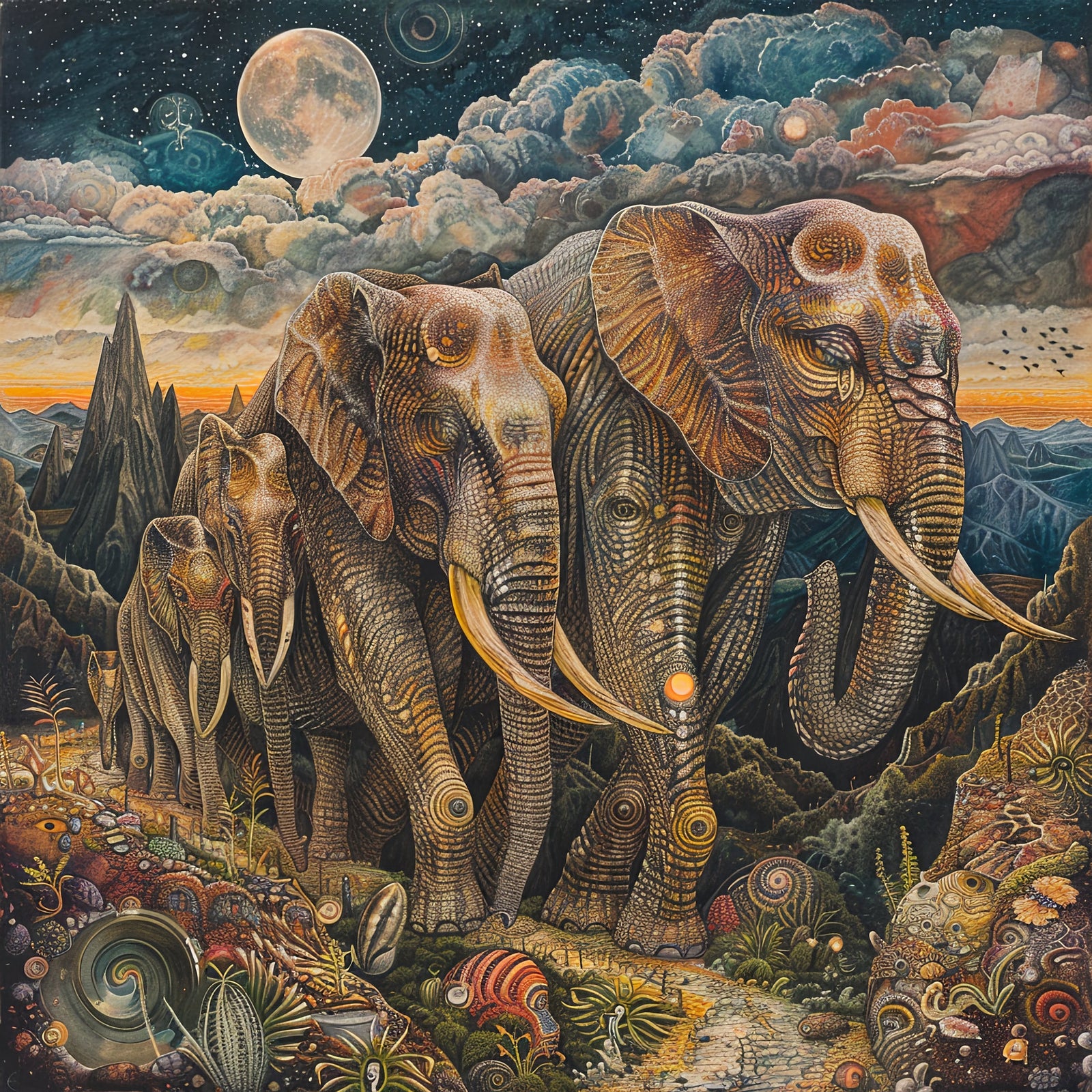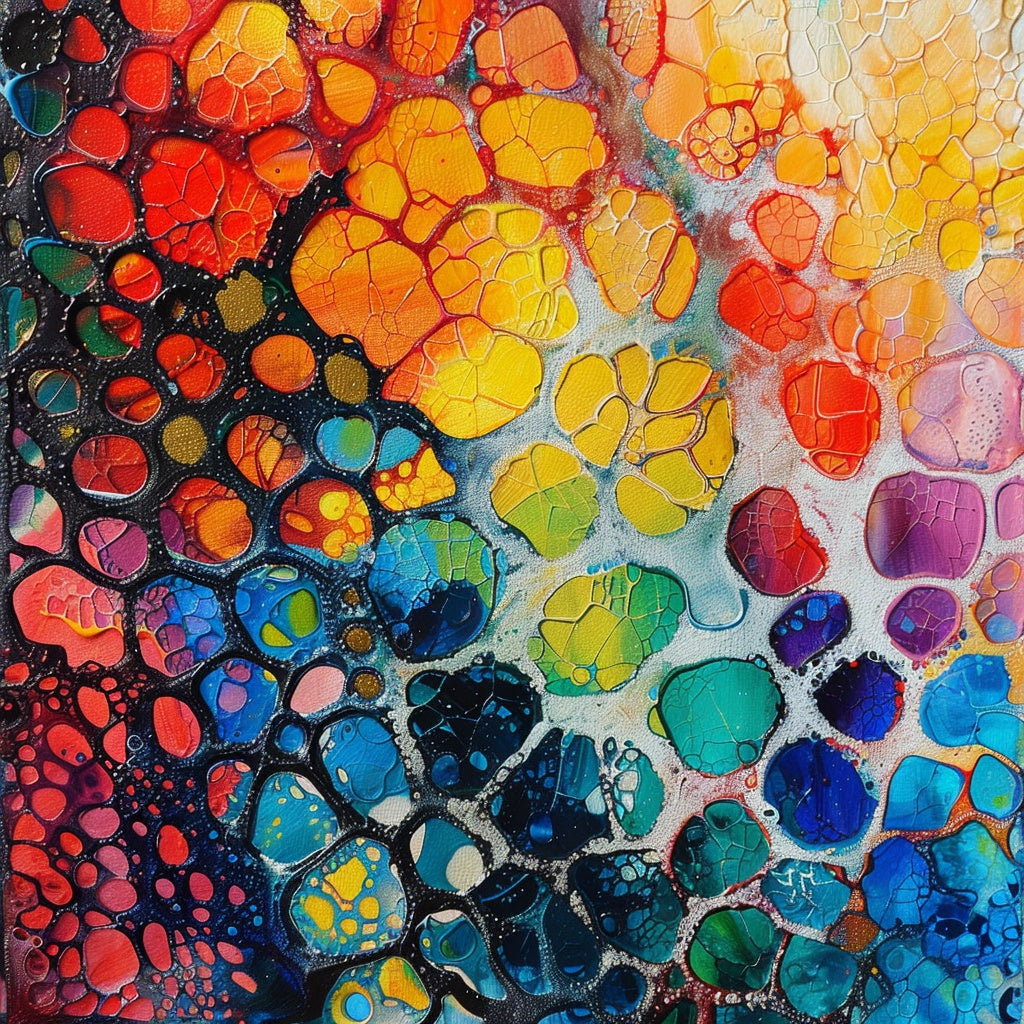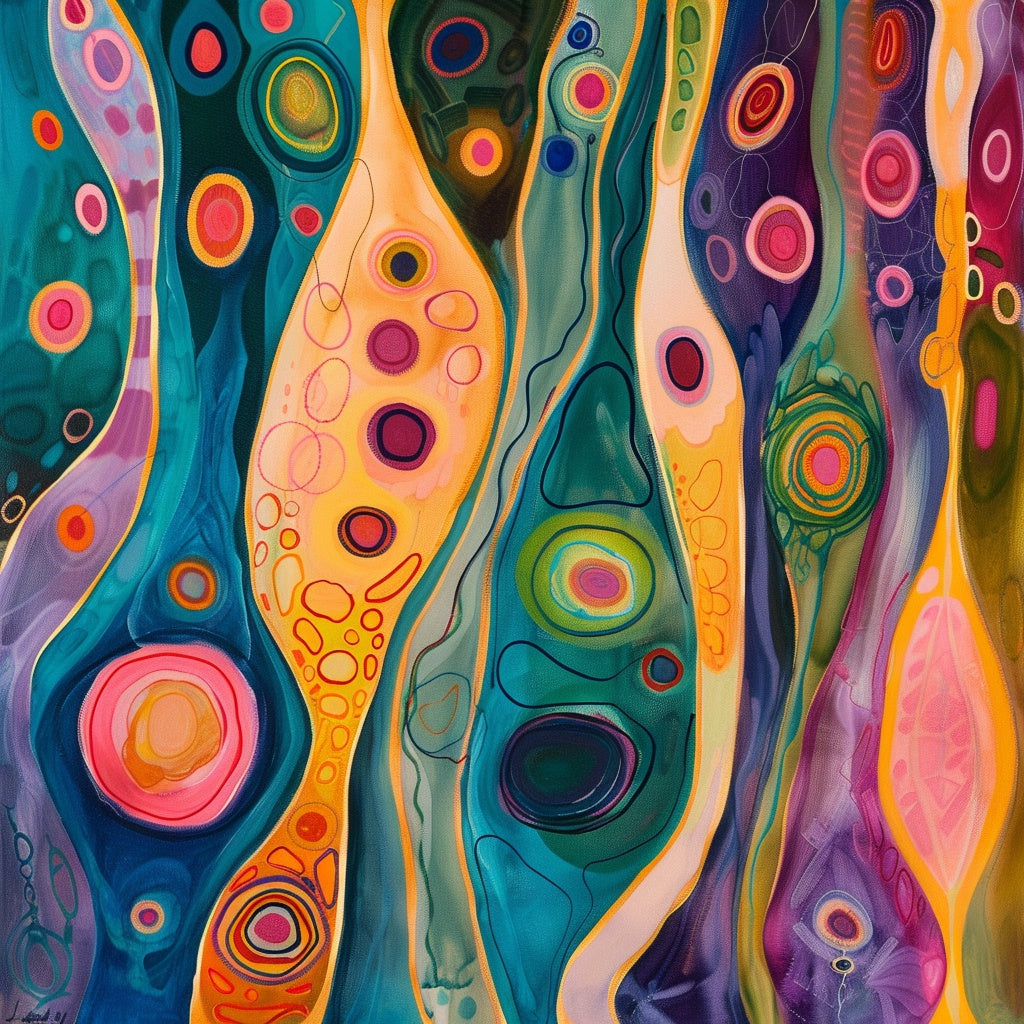AI's Revolutionary Impact on Art, Design, and Culture
Artificial intelligence (AI) is rapidly transforming the world around us, and its influence on art, design, and culture is particularly profound. This article delves into the multifaceted ways AI is revolutionizing these fields, from creating novel artworks to preserving cultural heritage. Prepare to explore the exciting possibilities that emerge when human creativity meets machine intelligence.
Table of Contents
- AI in Art Creation
- AI in Design
- AI in Cultural Preservation
- AI and the Art Market
- The Future of AI in Art, Design, and Culture
AI in Art Creation
AI is no longer just a tool but a creative force, empowering artists with new ways to explore artistic expression [1]. By analyzing extensive datasets of existing artworks, AI algorithms can identify patterns and styles, generating unique pieces that either emulate or diverge from established artistic traditions [2].
Generative Adversarial Networks (GANs)
One of the most remarkable applications of AI in art creation is through generative adversarial networks (GANs) [2]. GANs consist of two neural networks: a generator and a discriminator [2]. The generator creates images, while the discriminator evaluates them for authenticity [2]. This dynamic interplay pushes the generator to produce increasingly realistic and original images, resulting in captivating and often unexpected artworks [2]. Imagine it as a constant dialogue between a forger trying to create a perfect copy and an art expert trying to spot the fake. The forger keeps getting better, and soon the copies become indistinguishable from the real thing.
Interactive Installations
AI is also transforming how we experience art through interactive installations [3]. These installations use AI algorithms to respond to viewer movements or inputs, creating dynamic and engaging experiences that blur the lines between observer and participant [3]. For instance, "Blob Opera," an AI-powered musical experience, allows users to interact with digital blobs that sing in response to their movements, fostering a playful and collaborative environment [3, 4]. Similarly, "Art Selfie," an application that uses AI to find your lookalike in famous artworks, creates a personal and engaging connection with art history [3, 4]. These installations make art less of a passive experience and more of an interactive exchange.
Style Transfer
Another groundbreaking technique is style transfer, which allows artists to apply the artistic style of one image to another [5]. Consider merging the vibrant colors of Van Gogh's "Starry Night" with a photograph of a modern cityscape [5]. The result is a unique fusion of artistic influences, demonstrating the possibilities for artists to experiment with different styles and create truly original compositions [5]. It's like having the ability to paint in the style of any master artist, instantly.
AI in Music
Beyond visual art, AI is making significant strides in the realm of music. AI algorithms can now compose original musical pieces, generate lyrics, and even create personalized playlists based on individual preferences [1]. This could revolutionize the music industry by offering new tools for musicians and composers while also creating personalized listening experiences for audiences [1]. It's like having a personal composer that knows your taste and can create music just for you.
Examples of AI-Generated Art
AI-generated art is becoming more prominent in the art world. "Portrait of Edmond de Belamy," created by the Obvious collective, was the first AI-generated artwork to be auctioned at Christie's, selling for $432,500 [4, 6]. This marked a significant step towards the acceptance of AI art in the mainstream art world [4]. It's no longer just a novelty; it's a recognized form of artistic expression.
AI in Design
AI is not only transforming art creation but also revolutionizing the field of design [4]. From architecture and graphic design to product design and fashion, AI is offering new tools and techniques for creating innovative and efficient designs [4].
AI in Architecture
AI algorithms can analyze vast amounts of data, such as building usage, location, environmental factors, and material costs, to generate and optimize building designs [7, 8]. This can lead to more energy-efficient and sustainable structures, reducing waste and costs while also creating aesthetically pleasing and functional spaces [7]. AI can also assist in construction planning by analyzing schedules and identifying potential risks, improving safety measures and streamlining the building process [7]. Think of it as having a super-powered architect that can consider every detail to create the perfect building.
AI in Graphic Design
In graphic design, AI is automating tasks such as image editing, logo design, and the creation of marketing materials [6, 9]. This allows designers to focus on the more creative and strategic aspects of their work, such as developing brand identities and crafting compelling visual narratives [6]. AI can generate variations of a logo design, enabling designers to quickly explore different options and refine their ideas [6]. It can also assist in creating personalized designs that cater to individual preferences, such as customized website designs or targeted advertising campaigns [3, 6]. It's like having an assistant designer that can handle the tedious tasks so you can focus on the creative vision.
AI in Marketing
One notable example of AI in design is BMW's digital art campaign [6, 8]. In collaboration with a creative technologist and art collector, BMW trained AI on 900 years of art history to create 50 new artworks, which were then projected onto a virtual rendition of the 8 Series Gran Coupe [8]. This campaign demonstrated AI's potential to generate visually stunning and innovative designs while also pushing the boundaries of traditional marketing strategies [8]. It's like creating art to advertise art, using AI as the medium.
AI in Cultural Preservation
AI is playing an increasingly vital role in the preservation and restoration of cultural heritage [8]. AI-powered tools can analyze and document features of cultural artifacts with remarkable precision, aiding in their protection, study, and restoration [8, 10].
Restoration of Damaged Artworks
One of the most significant applications of AI in cultural preservation is in the restoration of damaged artworks [9, 10]. AI algorithms can analyze damaged paintings or sculptures, identifying missing or faded sections and generating realistic reconstructions [9, 10]. This helps conservators restore artworks to their original state, preserving them for future generations [9]. For instance, AI models can meticulously examine artworks that require restoration, creating detailed images of the missing or damaged parts. By considering the existing elements of the artwork, these models help conservators understand the original context and style, enabling a more accurate and faithful restoration process [9, 11]. Imagine having a virtual restorer that can piece together the past with incredible detail.
Digitization of Cultural Artifacts
AI is also being used to digitize and make accessible vast amounts of cultural artifacts, such as historical texts, photographs, and audio recordings [10, 12]. This allows people worldwide to access and learn from cultural heritage that was previously inaccessible [10]. This digital transformation not only preserves these artifacts for future generations but also makes them readily available to scholars, educators, and the general public, fostering cultural understanding and appreciation [10]. It's like bringing the past into the present, making it accessible to everyone.
Digital Replicas
Furthermore, AI can be used to create digital replicas of cultural artifacts, allowing for virtual interaction and minimizing physical handling of delicate objects [10]. This is particularly valuable for preserving fragile or rare artifacts that are vulnerable to damage from handling or environmental factors [10]. It's like creating a perfect copy of a precious artifact, so you can study it without risk of damage.
Historical Research and Analysis
AI is also proving to be a valuable tool for historical research and analysis [12, 13]. Machine learning algorithms can sift through vast databases of digitized cultural materials, identifying patterns and uncovering hidden connections [12, 13]. By leveraging natural language processing (NLP), AI systems can analyze historical documents, speeches, and literary works, providing researchers with a deeper understanding of cultural trends, social dynamics, and historical events [13]. It's like having a super-powered research assistant that can uncover hidden patterns in historical data.
Global Examples
Specific examples of AI's impact on cultural preservation are emerging around the world. In China, AI has been successfully used to swiftly identify ancient coins without compromising their integrity [13, 14]. AI has also been used to enhance the digitization process of architectural heritage, yielding efficient and effective 3D documentation results [13, 14]. In Italy, AI was used as a 3D reconstruction tool for the Temple of Hera, showcasing its potential to recreate historical sites with remarkable accuracy [13, 14]. These examples show how AI is being used to preserve cultural heritage worldwide.
Preservation of Intangible Cultural Heritage
Moreover, AI is assisting in the preservation of intangible cultural heritage, such as traditional music, dance, and storytelling [11, 12]. AI techniques can capture, analyze, and replicate the nuances and subtleties of these cultural expressions, ensuring their transmission to future generations [11, 12]. It's like having a virtual time capsule that preserves the essence of cultural traditions.
Virtual and Augmented Reality
AI is also changing how we interact with cultural heritage through virtual reality and augmented reality (VR/AR) technologies [11, 15]. AI-powered algorithms generate realistic virtual environments that transport users to historical sites, allowing them to explore cultural landmarks, interact with artifacts, and witness historical events as if they were present [11, 15]. These immersive experiences enhance cultural appreciation and foster a deeper connection with heritage [11, 15]. It's like stepping into a time machine and experiencing history firsthand.
AI and the Art Market
AI is not only influencing the creation of art but also transforming the art market itself. AI algorithms can be used to analyze market data, predict the value of artworks, and identify potential investment opportunities [7, 15]. This has the potential to bring greater transparency and efficiency to the art market, which has traditionally been opaque and reliant on subjective valuations [7]. It’s like having a financial analyst for the art world.
Changes in the Art Market
Here is a table summarizing the differences between the traditional and AI-influenced art market:
| Feature | Traditional Art Market | AI-Influenced Art Market |
|---|---|---|
| Valuation | Subjective, based on expert opinions and historical data | Data-driven, using AI algorithms to analyze market trends and predict value |
| Accessibility | Often exclusive, with high barriers to entry for new collectors | Potentially more accessible, with AI tools providing insights and guidance for collectors |
| Transparency | Limited transparency in pricing and sales data | Increased transparency through AI-powered analysis and market predictions |
| Efficiency | Manual processes for research and authentication | Automated processes using AI for research, authentication, and market analysis |
AI is also changing how art is bought and sold. Online platforms and auction houses are increasingly using AI to facilitate transactions, connect buyers and sellers, and provide personalized recommendations [16]. This is making the art market more accessible to a wider audience and creating new opportunities for artists and collectors [16]. It’s like having a personal art advisor that can guide you through the art world.
The Future of AI in Art, Design, and Culture
The future of AI in art, design, and culture is full of possibilities. As AI technology continues to advance, we can expect to see even more innovative and creative applications of AI in the art world [17].
Increased Realism and Detail
AI algorithms will continue to improve, generating highly realistic and detailed artworks that blur the lines between AI-generated and human-created art [3, 17]. This could lead to new forms of artistic expression that challenge our understanding of what constitutes art and creativity [17]. It's like seeing a photo that's so real, it could be a painting.
Enhanced Personalization and Customization
AI will be used to create even more personalized art experiences, tailoring artworks to individual preferences and creating interactive installations that respond to viewer input in real-time [17]. This could lead to a more engaging and immersive art experience for audiences [17]. It’s like having an art piece that adapts to your feelings and thoughts.
New Forms of Artistic Expression
AI could lead to the development of entirely new art forms and creative mediums that we cannot even imagine today [18]. This could fundamentally change how we create and experience art, pushing the boundaries of human imagination and creativity [18]. It's like exploring an unknown frontier of artistic possibilities.
Greater Accessibility and Inclusivity
AI could make art creation and cultural experiences more accessible to people from all backgrounds, regardless of their physical abilities or artistic skills [18]. This could democratize the art world and foster greater cultural understanding and appreciation [18]. It's like opening the doors of art to everyone, regardless of their background.
AI and Sustainability in Art
AI is also playing a role in promoting sustainability in art [7, 19]. AI-driven art is joining the movement, creating pieces that process vast amounts of environmental data [7, 19]. We're observing AI algorithms generating stunning visuals that make complex ecological concepts more accessible to the public [7, 19]. This can raise awareness about environmental issues and inspire action towards a more sustainable future [7, 19]. Examples of eco-art include interactive installations showing sea level rise, sculptures made from recycled plastics, and digital art visualizing climate data [7, 19]. AI can also be used to promote sustainable art practices, such as creating virtual galleries that reduce the need for physical exhibition space, using AI-powered tools to minimize material waste in art production, and utilizing digital art formats that lower transportation needs [7, 19]. It's like using art to promote a better future for the planet.
In conclusion, AI is revolutionizing the world of art, design, and culture in unprecedented ways [20]. It provides artists with new tools for creative expression, enhances cultural preservation efforts, and is transforming the art market [20]. The future of art is likely to be a collaborative one, where human creativity and machine intelligence work together to create new and innovative forms of artistic expression [20, 21]. This collaboration presents both challenges and opportunities, emphasizing the importance of maintaining the human element in art and design [21]. Artists and designers must embrace AI as a tool to enhance their creativity, not replace it [21]. The future of art is not just about technology; it's about the human spirit and our capacity for creative expression, and AI can be a powerful partner in shaping that future [21, 22].
Engage with AI art, explore its possibilities, and participate in the ongoing conversation about its impact on culture. The future of art is in our hands, and AI can be a valuable partner in shaping that future [22].
Footnotes
- How AI is changing arts and culture – On the Issues - Microsoft News, accessed January 30, 2025, https://news.microsoft.com/on-the-issues/2019/07/30/ai-changing-arts-culture/
- Art in an age of artificial intelligence - PMC, accessed January 30, 2025, https://pmc.ncbi.nlm.nih.gov/articles/PMC9749485/
- What Is AI-Generated Art? | IxDF - The Interaction Design Foundation, accessed January 30, 2025, https://www.interaction-design.org/literature/topics/ai-generated-art
- What is AI art & how does it work? - Adobe Firefly, accessed January 30, 2025, https://www.adobe.com/products/firefly/discover/what-is-ai-art.html
- The Influence of AI on Art and Culture - Training Solutions, accessed January 30, 2025, https://esoftskills.com/the-influence-of-ai-on-art-and-culture/
- Future Trends: AI and the Next Decade of Visual Arts - Transforming Creativity and Artistic Expression - PRO EDU, accessed January 30, 2025, https://proedu.com/blogs/photoshop-skills/future-trends-ai-and-the-next-decade-of-visual-arts-transforming-creativity-and-artistic-expression
- 10 Mind-Blowing Examples of AI Generated Art - ClickUp, accessed January 30, 2025, https://clickup.com/blog/ai-art-examples/
- These Artists Are Using AI as a Creative Partner. See How! - Worklife VC, accessed January 30, 2025, https://www.worklife.vc/blog/ai-artist
- 10 AI Design Examples That Saved Our Clients Over $300,000 - Superside, accessed January 30, 2025, https://www.superside.com/blog/ai-design-examples
- AI in Art and Cultural Heritage Conservation - Ultralytics, accessed January 30, 2025, https://www.ultralytics.com/blog/ai-in-art-and-cultural-heritage-conservation
- The Role of Artificial Intelligence and Machine Learning in preserving Cultural Heritage and Art Works via Virtual Restoration, accessed January 30, 2025, https://isprs-annals.copernicus.org/articles/X-1-W1-2023/185/2023/isprs-annals-X-1-W1-2023-185-2023.pdf
- Revolutionising Creativity: AI's Impact on the Art World - World Art Dubai, accessed January 30, 2025, https://www.worldartdubai.com/revolutionising-creativity-ais-impact-on-the-art-world
- The Transformative Impact of AI on Cultural Preservation - Artificial Paintings, accessed January 30, 2025, https://artificialpaintings.com/blog/2024/06/12/the-transformative-impact-of-ai-on-cultural-preservation/
- Cultural heritage preservation in the digital age, harnessing artificial intelligence for the future: a bibliometric analysis | Emerald Insight, accessed January 30, 2025, https://www.emerald.com/insight/content/doi/10.1108/dlp-01-2024-0018/full/html
- The Impact Of Artificial Intelligence On The Art World - Forbes, accessed January 30, 2025, https://www.forbes.com/councils/forbesbusinesscouncil/2024/02/02/the-impact-of-artificial-intelligence-on-the-art-world/
- Exploring the Future of AI Art Creators: A Comprehensive Guide - Ocoya, accessed January 30, 2025, https://www.ocoya.com/blog/ai-art-future



Leave a comment (all fields required)